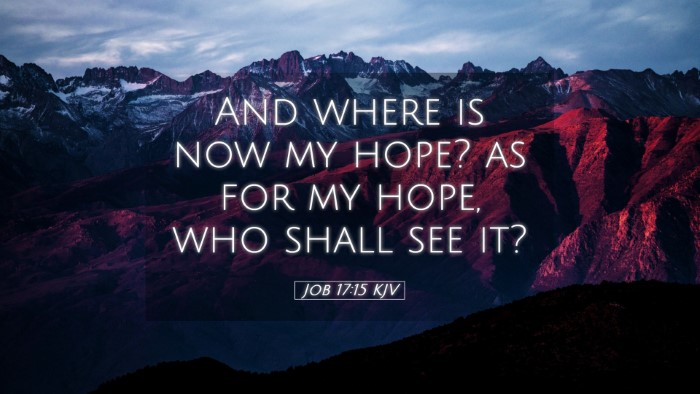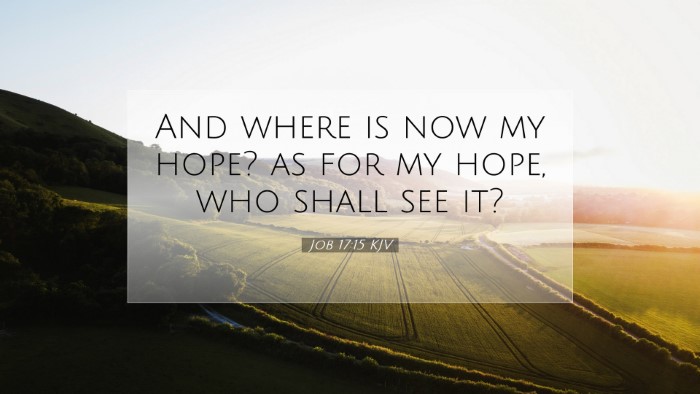Old Testament
Genesis Exodus Leviticus Numbers Deuteronomy Joshua Judges Ruth 1 Samuel 2 Samuel 1 Kings 2 Kings 1 Chronicles 2 Chronicles Ezra Nehemiah Esther Job Psalms Proverbs Ecclesiastes Song of Solomon Isaiah Jeremiah Lamentations Ezekiel Daniel Hosea Joel Amos Obadiah Jonah Micah Nahum Habakkuk Zephaniah Haggai Zechariah MalachiJob 17:15
Job 17:15 KJV
And where is now my hope? as for my hope, who shall see it?
Job 17:15 Bible Commentary
Commentary on Job 17:15
Job 17:15 states: "And where is now my hope? as for my hope, who shall see it?" In this verse, Job articulates a profound sense of desolation and reflects on the nature of hope in his suffering. This commentary draws insights from respected public domain commentaries, including those by Matthew Henry, Albert Barnes, and Adam Clarke, providing a nuanced understanding for pastors, students, theologians, and Bible scholars.
Context and Background
Job, a man of considerable righteousness, faces immense suffering and loss, prompting deep reflections on his life and faith. As his friends engage in theological debates about sin and divine justice, Job persists in arguing for his integrity while exploring themes of despair, hope, and the human condition.
This verse emerges from a context where Job's suffering has reached acute levels, and he is isolated in his pain. The rhetorical questions underscore his existential crisis, invoking universal sentiments about loss and the longing for hope.
Insights from Matthew Henry
Matthew Henry emphasizes that Job's question reflects the despair of the human condition, particularly in times of affliction. He observes:
- The Nature of Hope: Henry suggests that hope is essential for life; without it, one is left in spiritual and emotional desolation. Job questions the existence of his hope amidst suffering.
- Hope Found in God: Even in despair, Henry indicates that true hope can ultimately be found in God, who sustains believers through their tribulations. He urges the faithful to look beyond their immediate circumstances.
Insights from Albert Barnes
Albert Barnes provides nuanced theological commentary on Job 17:15, noting the following points:
- Rhetorical Questions: Barnes highlights the rhetorical nature of Job's questioning, indicating the depths of Job's doubt and the weight of his trials. The questions reflect a heart wrestling with faith amidst despair.
- Visibility of Hope: Barnes stresses the visibility aspect of hope; Job feels disconnected from his former resolute belief and questions who can see the hope he once had. This signifies a deeper theological exploration of faith under trial.
- Spiritual Desert: He parallels Job's plight with the spiritual desolation many believers face when navigating suffering, ensuring the commentary addresses both the internal and external struggles experienced by the faithful.
Insights from Adam Clarke
Adam Clarke’s commentary deepens the readers' understanding of Job’s lament and his contemplation of hope:
- Job's Condition: Clarke emphasizes Job's pitiable state as not just about physical suffering but also a psychological and spiritual crisis, marking a profound moment of vulnerability that resonates with the struggles faced by many.
- Hope as a Precious Commodity: He perceives hope as a precious commodity that can fluctuate dramatically with life circumstances and highlights Job's feelings of abandonment—not just by friends but seemingly by God as well.
- Biblical Hope: Clarke elucidates that biblical hope is tethered to God’s promises. Even amidst transient despair, believers are encouraged to root their hope in God's character and faithfulness, reminding readers that hope can endure despite appearances.
Theological Reflections
In combining these insights, the commentary on Job 17:15 unveils profound theological reflections:
- The Human Condition: Job's anguish serves as a representation of the universal human struggle with suffering and loss, stirring a collective empathy among readers who may face trials.
- The Role of Hope: The discourse presents hope as vital yet vulnerable, suggesting that it should be cultivated within the framework of faith rather than circumstances.
- Faith under Challenge: The verse encapsulates the challenge of maintaining faith when hope seems lost, prompting theological discussions about theodicy and divine justice.
- Community and Support: The commentary can lead to reflections on the responsibility of the faith community to support those in distress, highlighting the need for love and empathy in theological discourse.
Conclusion
Job 17:15 resonates through the ages as it addresses the challenges of maintaining hope amidst suffering. Through the insights of Matthew Henry, Albert Barnes, and Adam Clarke, this reflection serves as both a warning and encouragement to persist in faith, even when hope feels obscured by despair.
Ultimately, Job's experience questions and redefines hope, urging believers today to seek a deeper relationship with the divine that transcends immediate despair and seeks an eternal perspective.


